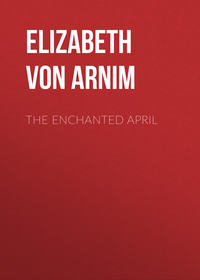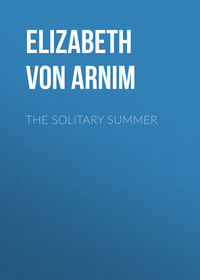 полная версия
полная версияIn the Mountains
And I withdrew with every appearance of reluctant but indomitable virtue into my little room and stayed there shut in safe till I heard them go out.
From the window I could see them presently starting off up the mountain, actively led by my uncle who hadn't succeeded in taking only one, Mrs. Barnes following with the devoutness—she who in our walks goes always first and chooses the way—of an obedient hen, and some way behind, as though she disliked having to shed her cobwebs as much as I do, straggled Dolly. Then, when they had dwindled into just black specks away up the slope, I turned with lively pleasure to paying the books.
Those blessed books! If only I could have gone on paying them over and over again, paying them all day! But when I had done them, and conversed about the hens and bees and cow with Antoine, and it was getting near lunch-time, and at any moment through the window I might see the three specks that had dwindled appearing as three specks that were swelling, I thought I noticed I had a headache.
Addings-up often give me a headache, especially when they won't, which they curiously often won't, add up the same twice running, so that it was quite likely that I had got a headache. I sat waiting to be quite sure, and presently, just as the three tiny specks appeared on the sky line, I was quite sure; and I came up here and put myself to bed. For, I argued, it isn't grape-stones this time, it's sums, and Mrs. Barnes can't dose me for what is only arithmetic; also, even if Uncle Rudolph insists on coming to my bedside he can't be so inhumane as to torment somebody who isn't very well.
So here I have been ever since snugly in bed, and I must say my guests have been most considerate. They have left me almost altogether alone. Mrs. Barnes did look in once, and when I said, closing my eyes, 'It's those tradesmens' books—' she understood immediately, and simply nodded her head and disappeared.
Dolly came and sat with me for a little, but we hadn't said much before Mrs. Antoine brought a message from my uncle asking her to go down to tea.
'What are you all doing?' I asked.
'Oh, just sitting round the fire not talking,' she said, smiling.
'Not talking?' I said, surprised.
But she was gone.
Perhaps, I thought, they're not talking for fear of disturbing me. This really was most considerate.
As for Uncle Rudolph, he hasn't even tried to come and see me. The only sign of life he has made was to send me the current number of the Nineteenth Century he brought out with him, in which he has an article,—a very good one. Else he too has been quite quiet; and I have read, and I have pondered, and I have written this, and now it really is bedtime and I'm going to sleep.
Well, a whole day has been gained anyhow, and I have had hours and hours of complete peace. Rather a surprising lot of peace, really. It is rather surprising, I think. I mean, that they haven't wanted to come and see me more. Nobody has even been to say goodnight to me. I think I like being said goodnight to. Especially if nobody does say it.
October 2nd.
Twenty-four hours sometimes produce remarkable changes. These have.
Again it is night, and again I'm in my room on my way to going to sleep; but before I get any sleepier I'll write what I can about to-day, because it has been an extremely interesting day. I knew that what we wanted was a man.
At breakfast, to which I proceeded punctually, refreshed by my retreat yesterday, armed from head to foot in all the considerations I had collected during those quiet hours most likely to make me immune from Uncle Rudolph's inevitable attacks, having said my prayers and emptied my mind of weakening memories, I found my three guests silent. Uncle Rudolph's talkativeness, so conspicuous at yesterday's breakfast, was confined at to-day's to saying grace. Except for that, he didn't talk at all. And neither, once having said her Amen, did Mrs. Barnes. Neither did Dolly, but then she never does.
'I've not got a headache,' I gently said at last, looking round at them.
Perhaps they were still going on being considerate, I thought. At least, perhaps Mrs. Barnes was. My uncle's silence was merely ominous of what I was in for, of how strongly, after another night's thinking it out, he felt about my affairs and his own lamentable connection with them owing to God's having given me to him for a niece. But Mrs. Barnes—why didn't she talk? She couldn't surely intend, because once I had a headache, to go on tiptoe for the rest of our days together?
Nobody having taken any notice of my first announcement I presently said, 'I'm very well indeed, thank you, this morning.'
At this Dolly laughed, and her eyes sent little morning kisses across to me. She, at least, was in her normal state.
'Aren't you—' I looked at the other two unresponsive breakfasting heads—'aren't you glad?'
'Very,' said Mrs. Barnes. 'Very.' But she didn't raise her eyes from her egg, and my uncle again took no notice.
So then I thought I might as well not take any notice either, and I ate my breakfast in dignity and retirement, occasionally fortifying myself against what awaited me after it by looking at Dolly's restful and refreshing face.
Such an unclouded face; so sweet, so clean, so sunny with morning graciousness. Really an ideal breakfast-table face. Fortunate Juchs and Siegfried, I thought, to have had it to look forward to every morning. That they were undeserving of their good fortune I patriotically felt sure, as I sat considering the gentle sweep of her eyelashes while she buttered her toast. Yet they did, both of them, make her happy; or perhaps it was that she made them happy, and caught her own happiness back again, as it were on the rebound. With any ordinarily kind and decent husband this must be possible. That she had been happy was evident, for unhappiness leaves traces, and I've never seen an object quite so unmarked, quite so candid as Dolly's intelligent and charming brow.
We finished our breakfast in silence; and no sooner had the table been plucked out from our midst by the swift, disconcerting Antoines, than my uncle got up and went to the window.
There he stood with his back to us.
'Do you feel equal to a walk?' he asked, not turning round.
Profound silence.
We three, still sitting round the blank the vanished table had left, looked at each other, our eyes inquiring mutely, 'Is it I?'
But I knew it was me.
'Do you mean me, Uncle Rudolph?' I therefore asked; for after all it had best be got over quickly.
'Yes, dear child.'
'Now?'
'If you will.'
'There's no esc—you don't think the weather too horrid?'
'Bracing.'
I sighed, and went away to put on my nailed boots.
Relations … what right had he … as though I hadn't suffered horribly … and on such an unpleasant morning … if at least it had been fine and warm … but to be taken up a mountain in a bitter wind so as to be made miserable on the top....
And two hours later, when I was perched exactly as I had feared on a cold rock, reached after breathless toil in a searching wind, perched draughtily and shorn of every cob-web I could ever in my life have possessed, helplessly exposed to the dreaded talking-to, Uncle Rudolph, settling himself at my feet, after a long and terrifying silence during which I tremblingly went over my defences in the vain effort to assure myself that perhaps I wasn't going to be much hurt, said:
'How does she spell it?'
Really one is very fatuous. Absorbed in myself, I hadn't thought of Dolly.
October 3rd.
It was so late last night when I got to that, that I went to bed. Now it is before breakfast, and I'll finish about yesterday.
Uncle Rudolph had taken me up the mountain only to talk of Dolly. Incredible as it may seem, he has fallen in love. At first sight. At sixty. I am sure a woman can't do that, so that this by itself convinces me he is a man. Three days ago I wrote in this very book that a dean isn't quite my idea of a man. I retract. He is.
Well, while I was shrinking and shivering on my own account, waiting for him to begin digging about among my raw places, he said instead, 'How does she spell it?' and threw my thoughts into complete confusion.
Blankly I gazed at him while I struggled to rearrange them on this new basis. It was such an entirely unexpected question. I did not at this stage dream of what had happened to him. It never would have occurred to me that Dolly would have so immediate an effect, simply by sitting there, simply by producing her dimple at the right moment. Attractive as she is, it is her ways rather than her looks that are so adorable; and what could Uncle Rudolph have seen of her ways in so brief a time? He has simply fallen in love with a smile. And he sixty. And he one's uncle. Amazing Dolly; irresistible apparently, to uncles.
'Do you mean Mrs. Jewks's name?' I asked, when I was able to speak.
'Yes,' said my uncle.
'I haven't seen it written,' I said, restored so far by my relief—for Dolly had saved me—that I had the presence of mind to hedge. I was obliged to hedge. In my mind's eye I saw Mrs. Barnes's face imploring me.
'No doubt,' said my uncle after another silence, 'it is spelt on the same principle as Molyneux.'
'Very likely,' I agreed.
'It sounds as though her late husband's family might originally have been French.'
'It does rather.'
'Possibly Huguenot.'
'Yes.'
'I was much astonished that she should be a widow.'
'Yet not one widow but two widows....' ran at this like a refrain in my mind, perhaps because I was sitting so close to a dean. Aloud I said, for by now I had completely recovered, 'Why, Uncle Rudolph? Widows do abound.'
'Alas, yes. But there is something peculiarly virginal about Mrs. Jewks.'
I admitted that this was so. Part of Dolly's attractiveness is the odd impression she gives of untouchedness, of gay aloofness.
My uncle broke off a stalk of the withered last summer's grass and began nibbling it. He was lying on his side a little below me, resting on his elbow. His black, neat legs looked quaint stuck through the long yellow grass. He had taken off his hat, hardy creature, and the wind blew his grey hair this way and that, and sometimes flattened it down in a fringe over his eyes. When this happened he didn't look a bit like anybody good, but he pushed it back each time, smoothing it down again with an abstracted carefulness, his eyes fixed on the valley far below. He wasn't seeing the valley.
'How long has the poor young thing—' he began.
'You will be surprised to hear,' I interrupted him, 'that Mrs. Jewks is forty.'
'Really,' said my uncle, staring round at me. 'Really. That is indeed surprising.' And after a pause he added, 'Surprising and gratifying.'
'Why gratifying, Uncle Rudolph?' I inquired.
'When did she lose her husband?' he asked, taking no notice of my inquiry.
The preliminary to an accurate answer to this question was, of course, Which? But again a vision of Mrs. Barnes's imploring face rose before me, and accordingly, restricting myself to Juchs, I said she had lost him shortly before the war.
'Ah. So he was prevented, poor fellow, from having the honour of dying for England.'
'Yes, Uncle Rudolph.'
'Poor fellow. Poor fellow.'
'Yes.'
'Poor fellow. Well, he was spared knowing what he had missed. At least he was spared that. And she—his poor wife—how did she take it?'
'Well, I think.'
'Yes. I can believe it. She wouldn't—I am very sure she wouldn't—intrude her sorrows selfishly on others.'
It was at this point that I became aware my uncle had fallen in love. Up to this, oddly enough, it hadn't dawned on me. Now it did more than dawned, it blazed.
I looked at him with a new and startled interest. 'Uncle Rudolph,' I said impetuously, no longer a distrustful niece talking to an uncle she suspects, but an equal with an equal, a human being with another human being, 'haven't you ever thought of marrying again? It's quite a long time now since Aunt Winifred—'
'Thought?' said my uncle, his voice sounding for the first time simply, ordinarily human, without a trace in it of the fatal pulpit flavour, 'Thought? I'm always thinking of it.'
And except for his apron and gaiters he might have been any ordinary solitary little man eating out his heart for a mate.
'But then why don't you? Surely a deanery of all places wants a wife in it?'
'Of course it does Those strings or rooms—empty, echoing. It shouts for a wife. Shouts, I tell you. At least mine does. But I've never found—I hadn't seen—'
He broke off, biting at the stalk of grass.
'But I remember you,' I went on eagerly, 'always surrounded by flocks of devoted women. Weren't any of them—?'
'No,' said my uncle shortly. And after a second of silence he said again, and so loud that I jumped, 'No!' And then he went on even more violently, 'They didn't give me a chance. They never let me alone a minute. After Winifred's death they were like flies. Stuck to me—made me sick—great flies crawling—' And he shuddered, and shook himself as though he were shaking off the lot of them.
I looked at him in amazement. 'Why,' I cried, 'you're talking exactly like a man!'
But he, staring at the view without seeing an inch of it, took no heed of me, and I heard him say under his breath as though I hadn't been there at all, 'My God, I'm so lonely at night!'
That finished it. In that moment I began to love my uncle. At this authentic cry of forlornness I had great difficulty in not bending over and putting my arms round him,—just to comfort him, just to keep him warm. It must be a dreadful thing to be sixty and all alone. You look so grown up. You look as though you must have so many resources, so few needs; and you are accepted as provided for, what with your career accomplished, and your houses and servants and friends and books and all the rest of it—all the empty, meaningless rest of it; for really you are the most miserable of motherless cold babies, conscious that you are motherless, conscious that nobody soft and kind and adoring is ever again coming to croon over you and kiss you good-night and be there next morning to smile when you wake up.
'Uncle Rudolph—' I began.
Then I stopped, and bending over took the stalk of grass he kept on biting out of his hand.
'I can't let you eat any more of that,' I said. 'It's not good for you.'
And having got hold of his hand I kept it.
There now, I said, holding it tight.
He looked up at me vaguely, absorbed in his thoughts; then, realising how tight his hand was being held, he smiled.
'You dear child,' he said, scanning my face as though he had never seen it before.
'Yes?' I said, smiling in my turn and not letting go of his hand. 'I like that. I didn't like any of the other dear children I was.'
'Which other dear children?'
'Uncle Rudolph,' I said, 'let's go home. This is a bleak place. Why do we sit here shivering forlornly when there's all that waiting for us down there?'
And loosing his hand I got on to my feet, and when I was on them I held out both my hands to him and pulled him up, and he standing lower than where I was our eyes were then on a level.
'All what?' he asked, his eyes searching mine.
'Oh, Uncle Rudolph! Warmth and Dolly, of course.'
October 4th.
But it hasn't been quite so simple. Nothing last night was different. My uncle remained tongue-tied. Dolly sat waiting to smile at anecdotes that he never told. Mrs. Barnes knitted uneasily, already fearing, perhaps, because of his strange silence, that he somehow may have scented Siegfried, else how inexplicable his silence after that one bright, wonderful first evening and morning.
It was I last night who did the talking, it was I who took up the line, abandoned by my uncle, of wholesome entertainment. I too told anecdotes; and when I had told all the ones I knew and still nobody said anything, I began to tell all the ones I didn't know. Anything rather than that continued uncomfortable silence. But how very difficult it was. I grew quite damp with effort. And nobody except Dolly so much as smiled; and even Dolly, though she smiled, especially when I embarked on my second series of anecdotes, looked at me with a mild inquiry, as if she were wondering what was the matter with me.
Wretched, indeed, is the hostess upon whose guests has fallen, from whatever cause, a blight.
October 5th.
Crabbe's son, in the life he wrote of his father, asks: 'Will it seem wonderful when we consider how he was situated at this time, that with a most affectionate heart, a peculiar attachment to female society, and with unwasted passions, Mr. Crabbe, though in his sixty-second year should have again thought of marriage? I feel satisfied that no one will be seriously shocked with such an evidence of the freshness of his feelings.'
A little shocked; Crabbe's son was prepared to allow this much; but not seriously.
Well, it is a good thing my uncle didn't live at that period, for it would have gone hard with him. His feelings are more than fresh, they are violent.
October 6th.
While Dolly is in the room Uncle Rudolph never moves, but sits tongue-tied staring at her. If she goes away he at once gets up and takes me by the arm and walks me off on to the terrace, where in a biting wind we pace up and down.
Our positions are completely reversed. It is I now who am the wise old relative, counselling, encouraging, listening to outpours. Up and down we pace, up and down, very fast because of the freshness of Uncle's Rudolph's feelings and also of the wind, arm in arm, I trying to keep step, he not bothering about such things as step, absorbed in his condition, his hopes, his fears—especially his fears. For he is terrified lest, having at last found the perfect woman, she won't have him. 'Why should she?' he asks almost angrily, 'Why should she? Tell me why she should.'
'I can't tell you,' I say, for Uncle Rudolph and I are now the frankest friends. 'But I can't tell you either why she shouldn't. Think how nice you are, Uncle Rudolph. And Dolly is naturally very affectionate.'
'She is perfect, perfect,' vehemently declares my uncle.
And Mrs. Barnes, who from the window watches us while we walk, looks with anxious questioning eyes at my face when we come in. What can my uncle have to talk about so eagerly to me when he is out on the terrace, and why does he stare in such stony silence at Dolly when he comes in? Poor Mrs. Barnes.
October 7th.
The difficulty about Dolly for courting purposes is that she is never to be got alone, not even into a corner out of earshot of Mrs. Barnes. Mrs. Barnes doesn't go away for a moment, except together with Dolly. Wonderful how clever she is at it. She is obsessed by terror lest the horrid marriage to the German uncle should somehow be discovered. If she was afraid of my knowing it she is a hundred times more afraid of Uncle Rudolph's knowing it. So persistent is her humility, so great and remote a dignitary does he seem to her, that the real situation hasn't even glimmered on her. All she craves is to keep this holy and distinguished man's good opinion, to protect her Dolly, her darling erring one, from his just but unbearable contempt. Therefore she doesn't budge. Dolly is never to be got alone.
'A man,' said my uncle violently to me this morning, 'can't propose to a woman before her sister.'
'You've quite decided you're going to?' I asked, keeping up with him as best I could, trotting beside him up and down the terrace.
'The minute I can catch her alone. I can't stand any more of this. I must know. If she won't have me—my God, if she won't have me—!'
I laid hold affectionately of his arm. 'Oh, but she will,' I said reassuringly. 'Dolly is rather a creature of habit, you know.'
'You mean she has got used to marriage—'
'Well, I do think she is rather used to it. Uncle Rudolph,' I went on, hesitating as I have hesitated a dozen times these last few days as to whether I oughtn't to tell him about Juchs—Siegfried would be a shock, but Juchs would be crushing unless very carefully explained—'you don't feel you don't think you'd like to know something more about Dolly first? I mean before you propose?'
'No!' shouted my uncle.
Afterwards he said more quietly that he could see through a brick wall as well as most men, and that Dolly wasn't a brick wall but the perfect woman. What could be told him that he didn't see for himself? Nothing, said my uncle.
What can be done with a man in love? Nothing, say I.
October 8th.
Sometimes I feel very angry with Dolly that she should have got herself so tiresomely mixed up with Germans. How simple everything would be now if only she hadn't! But when I am calm again I realise that she couldn't help it. It is as natural to her to get mixed up as to breathe. Very sweet, affectionate natures are always getting mixed up. I suppose if it weren't for Mrs. Barnes's constant watchfulness and her own earnest desire never again to distress poor Kitty, she would at an early stage of their war wanderings have become some ardent Swiss hotelkeeper's wife. Just to please him; just because else he would be miserable. Dolly ought to be married. It is the only certain way of saving her from marriage.
October 9th.
It is snowing. The wind howls, and the snow whirls, and we can't go out and so get away from each other. Uncle Rudolph is obliged, when Dolly isn't there, to continue sitting with Mrs. Barnes. He can't to-day hurry me out on to the terrace. There's only the hall in this house to sit in, for that place I pay the household books in is no more than a cupboard.
Uncle Rudolph could just bear Mrs. Barnes when he could get away from her; to-day he can't bear her at all. Everything that should be characteristic of a dean—patience, courtesy, kindliness, has been stripped off him by his eagerness to propose and the impossibility of doing it. There's nothing at all left now of what he was but that empty symbol, his apron.
October 10th.
My uncle is fermenting with checked, prevented courting. And he ought to be back in England. He ought to have gone back almost at once, he says. He only came out for three or four days—
'Yes; just time to settle me in,' I said.
'Yes,' he said, smiling, 'and then take you home with me by the ear.'
He has some very important meetings he is to preside at coming off soon, and here he is, hung up. It is Mrs. Barnes who is the cause of it, and naturally he isn't very nice to her. In vain does she try to please him; the one thing he wants her to do, to go away and leave him with Dolly, she of course doesn't. She sits there, saying meek things about the weather, expressing a modest optimism, ready to relinquish even that if my uncle differs, becoming, when he takes up a book, respectfully quiet, ready the moment he puts it down to rejoice with him if he wishes to rejoice or weep with him if he prefers weeping; and the more she is concerned to give satisfaction the less well-disposed is he towards her. He can't forgive her inexplicable fixedness. Her persistent, unintermittent gregariousness is incomprehensible to him. All he wants, being reduced to simplicity by love, is to be left alone with Dolly. He can't understand, being a man, why if he wants this he shouldn't get it.
'You're not kind to Mrs. Barnes,' I said to him this afternoon. 'You've made her quite unnatural. She is cowed.'
'I am unable to like her,' said my uncle shortly.
'You are quite wrong not to. She has had bitter troubles, and is all goodness. I don't think I ever met anybody so completely unselfish.'
'I wish she would go and be unselfish in her own room, then,' said my uncle.
'I don't know you,' I said, shrugging my shoulders. 'You arrived here dripping unction and charitableness, and now—'
'Why doesn't she give me a chance?' he cried. 'She never budges. These women who stick, who can't bear to be by themselves—good heavens, hasn't she prayers she ought to be saying, and underclothes she ought to mend?'
'I don't believe you care so very much for Dolly after all,' I said, 'or you would be kind to the sister she is so deeply devoted to.'
This sobered him. 'I'll try,' said my uncle; and it was quite hard not to laugh at the change in our positions—I the grey-beard now, the wise rebuker, he the hot-headed yet well-intentioned young relative.









